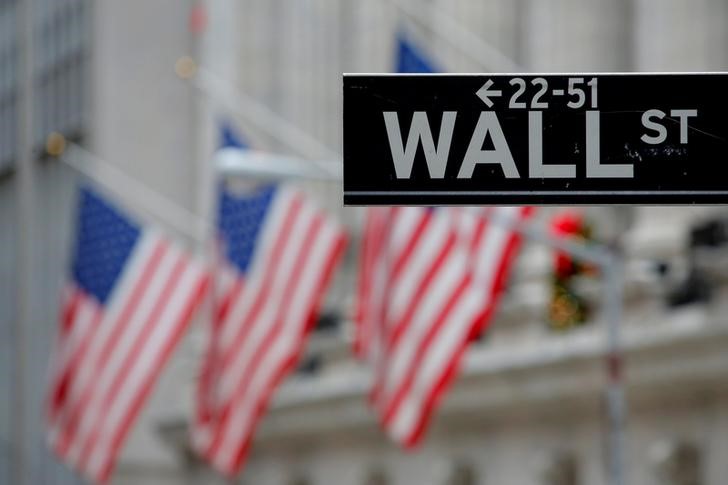By Pete Schroeder
WASHINGTON (Reuters) - U.S. regulators are considering changes to the "Volcker rule" Wall Street has sought for years that would make it easier and cheaper for banks to comply and allow them more leeway in trading and investing, according to several regulatory and industry sources.
Part of the Dodd-Frank reform law passed after the 2007-2009 financial crisis, the Volcker rule aimed to prevent banks, such as Goldman Sachs (N:GS) and JPMorgan Chase (N:JPM), from making risky market bets while accepting taxpayer-insured deposits.
The rule forced many Wall Street banks, which before the crisis could gamble on their own account across various assets, to restructure their businesses, including overhauling their trading operations and hiving off billions of dollars' worth of investment vehicles.
Yet banks and some of their customers say the rule, which runs at more than 1,000 pages, is too much of a burden for the financial industry by limiting banks' ability to facilitate investments and hedges for investors and depressing trading volumes in some assets.
They also say the rule's complexity and opacity makes it so difficult to satisfy that JP Morgan Chase chief executive Jamie Dimon was once quoted as saying traders would need a lawyer and a psychiatrist by their side to ensure they complied.
While the changes being considered by regulators would not bring back the heady pre-crisis trading activity, they would help address some of these problems, people familiar with the discussions said.
Modifications being considered include: scrapping the presumption that short-term trades are proprietary unless banks prove otherwise, making it clearer which types of funds banks are banned from investing in, permanently exempting some foreign funds from the ban, and anointing a lead regulator to oversee the rule's enforcement.
Congress is now considering a bill that would exempt lenders with under $10 billion in assets from the rule, but larger banks are lobbying for changes in how the rule is interpreted and applied to them. While financial regulators have said they agree on the need to revise the Volcker rule, some specific changes they are considering have not yet been reported.
Regulators are likely to release their proposals in coming months, in what is expected to be a milestone in President Donald Trump's promised push for less regulation that could save Wall Street billions of dollars.
"We're taking a fresh look at the Volcker rule," said Fed Chairman Jerome Powell before Congress on Tuesday.
The Fed, Federal Deposit Insurance Corporation (FDIC), Office of the Comptroller of the Currency (OCC), Securities and Exchange Commission (SEC) and Commodity Futures Trading Commission (CFTC) have joint responsibility for enforcing the rule and broadly agree it could be simplified.
"There's unanimity on a need to act," said one banker briefed on the matter.
Congress wrote the Volcker rule into law but regulators have broad discretion to determine how to make that a reality through writing and enforcing the regulations.
Staff at the agencies have begun gathering data and have identified potential changes, according to several people familiar with the effort. Work will accelerate once Jelena McWilliams becomes FDIC chair, among the last of Trump's top financial nominees who should be confirmed by the Senate in the coming months.
"You’re going to see momentum start building and start building quickly," said Tom Quaadman, executive vice president with the U.S. Chamber of Commerce.
Spokesmen for the Fed, FDIC, OCC and CFTC declined to comment. The SEC did not respond to a request for comment.
PRESUMPTION, DEFINITIONS
One major change being discussed would see the reversal of the "rebuttable presumption" which puts the onus on banks to prove their compliance with the Volcker rule. Now, all positions held for fewer than 60 days are considered banned proprietary trading unless banks convince regulators they serve a permitted purpose such as a client trade.
Banks want the burden of proof to shift to regulators, so that all trades will be allowed unless regulators identify an issue while supervising the banks, five people familiar with the discussions said.
Regulators are also considering narrowing the definitions of such terms as "proprietary trading" and "covered funds", they said. The latter prohibits investments in risky vehicles, such as hedge funds, but it also prevents banks from doing less risky business such as some forms of wealth management.
More clarity about what is allowed and what is not would give banks more flexibility in trading and investment, those people said.
Regulators are also considering further steps to exempt certain overseas funds affected by the rule because of links to banks with U.S. operations. Last July, regulators exempted such foreign funds for a year and are now considering a one year extension or possibly making the exemption permanent, two people briefed on the matter said.
There is general agreement on refining Volcker across the political spectrum, but Democrats - some of whom say the rule does not go far enough - are wary of handing too much discretion to banks when it comes to trading.
So far, banks have lobbied unsuccessfully for Congress to appoint a lead Volcker regulator, ideally the Fed, as part of a reform bill pending in the Senate, according to three sources.
Now, they are now pushing regulators to settle on a lead authority among themselves, or at least agree on a consistent standard for supervising and enforcing the rule.
Bankers and regulators acknowledge that getting all five watchdogs to march in lockstep will be tough and asking some of them to cede their authority will be even tougher.
The OCC initially seized the initiative issuing a public consultation on Volcker in August, but since then the Fed has taken the lead, banking sources said. Powell said on Tuesday the Fed was the "natural" lead for the rewriting effort.

"It's like turning an aircraft carrier," said Quaadman. "But now you're seeing they're beginning."